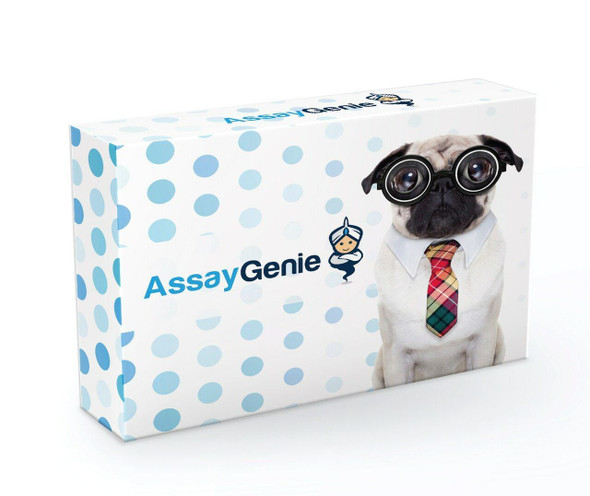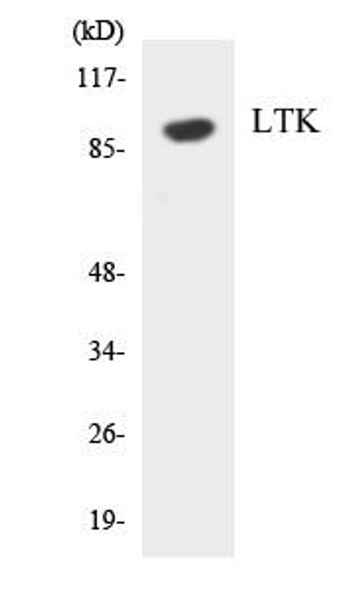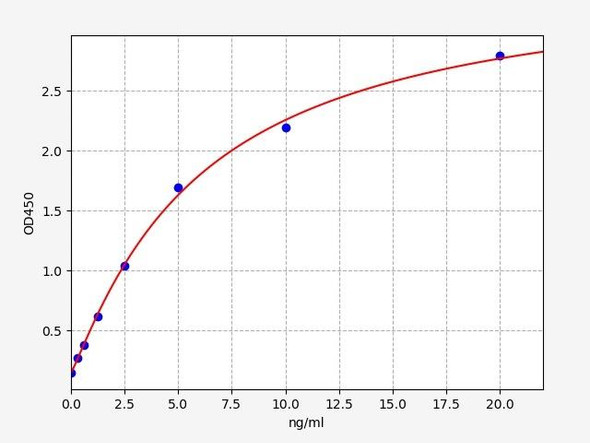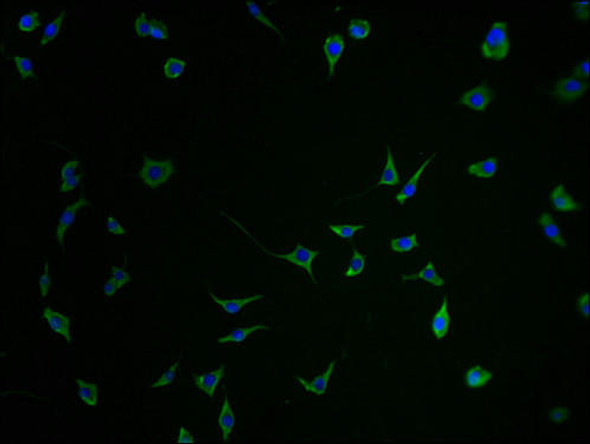Description
LTK Antibody (PACO55602)
The LTK Antibody (PAC056602) is a highly specific and sensitive tool for researchers studying the LTK protein, a receptor tyrosine kinase that has been implicated in a variety of cellular processes including cell growth, differentiation, and migration. This polyclonal antibody, derived from rabbit serum, has been validated for use in applications such as Western blot and immunofluorescence.With its high reactivity to human samples, the LTK Antibody enables researchers to accurately detect and analyze the LTK protein in various cell types, making it an indispensable tool for investigations in cell signaling, cancer biology, and developmental biology.
By targeting the LTK protein, researchers can gain valuable insights into the role of this receptor kinase in normal cellular function and disease pathology.The LTK Antibody from AssayGenie offers researchers a reliable and effective tool for studying the LTK protein and its involvement in key cellular processes. Whether investigating the mechanisms of cancer progression or exploring the potential therapeutic applications of targeting LTK, this antibody provides a valuable resource for advancing research in molecular biology and oncology.
| Antibody Name: | LTK Antibody (PACO55602) |
| Antibody SKU: | PACO55602 |
| Size: | 50ug |
| Host Species: | Rabbit |
| Tested Applications: | ELISA, IF |
| Recommended Dilutions: | ELISA:1:2000-1:10000, IF:1:50-1:200 |
| Species Reactivity: | Human |
| Immunogen: | Recombinant Human Leukocyte tyrosine kinase receptor protein (20-175AA) |
| Form: | Liquid |
| Storage Buffer: | Preservative: 0.03% Proclin 300 Constituents: 50% Glycerol, 0.01M PBS, pH 7.4 |
| Purification Method: | >95%, Protein G purified |
| Clonality: | Polyclonal |
| Isotype: | IgG |
| Conjugate: | Non-conjugated |
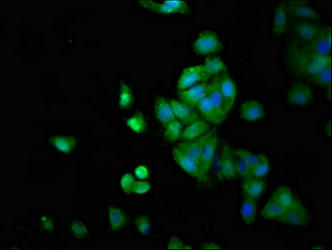 | Immunofluorescence staining of HepG2 cells with PACO55602 at 1:66, counter-stained with DAPI. The cells were fixed in 4% formaldehyde, permeabilized using 0.2% Triton X-100 and blocked in 10% normal Goat Serum. The cells were then incubated with the antibody overnight at 4°C. The secondary antibody was Alexa Fluor 488-congugated AffiniPure Goat Anti-Rabbit IgG(H+L). |
| Background: | Receptor with a tyrosine-protein kinase activity. The exact function of this protein is not known. Studies with chimeric proteins (replacing its extracellular region with that of several known growth factor receptors, such as EGFR and CSFIR) demonstrate its ability to promote growth and specifically neurite outgrowth, and cell survival. Signaling appears to involve the PI3 kinase pathway. Involved in regulation of the secretory pathway involving endoplasmic reticulum (ER) export sites (ERESs) and ER to Golgi transport. |
| Synonyms: | Leukocyte tyrosine kinase receptor (EC 2.7.10.1) (Protein tyrosine kinase 1), LTK, TYK1 |
| UniProt Protein Function: | LTK: Orphan receptor with a tyrosine-protein kinase activity. The exact function of this protein is not known. Studies with chimeric proteins (replacing its extracellular region with that of several known growth factor receptors, such as EGFR and CSFIR) demonstrate its ability to promote growth and specifically neurite outgrowth, and cell survival. Signaling appears to involve the PI3 kinase pathway. Involved in regulation of the secretory pathway involving endoplasmic reticulum (ER) export sites (ERESs) and ER to Golgi transport. Homodimer when bound to ligand (Probable). Part a complex including LTK, TNK2 and GRB2, in which GRB2 promotes LTK recruitment by TNK2. Expressed in non-hematopoietic cell lines and T- and B-cell lines. Belongs to the protein kinase superfamily. Tyr protein kinase family. Insulin receptor subfamily. 4 isoforms of the human protein are produced by alternative splicing. |
| UniProt Protein Details: | Protein type:Membrane protein, integral; Protein kinase, tyrosine (receptor); EC 2.7.10.1; Kinase, protein; Protein kinase, TK; TK group; Alk family Chromosomal Location of Human Ortholog: 15q15.1-q21.1 Cellular Component: integral to plasma membrane; membrane; plasma membrane Molecular Function:protein kinase activity; protein-tyrosine kinase activity Biological Process: cell proliferation; negative regulation of apoptosis; phosphoinositide 3-kinase cascade; protein amino acid phosphorylation; signal transduction |
| NCBI Summary: | The protein encoded by this gene is a member of the ros/insulin receptor family of tyrosine kinases. Tyrosine-specific phosphorylation of proteins is a key to the control of diverse pathways leading to cell growth and differentiation. Multiple transcript variants encoding different isoforms have been found for this gene. [provided by RefSeq, Oct 2008] |
| UniProt Code: | P29376 |
| NCBI GenInfo Identifier: | 143811416 |
| NCBI Gene ID: | 4058 |
| NCBI Accession: | P29376.3 |
| UniProt Secondary Accession: | P29376,A6NNJ8, B4DL89, E9PFX4, |
| UniProt Related Accession: | P29376 |
| Molecular Weight: | 78,714 Da |
| NCBI Full Name: | Leukocyte tyrosine kinase receptor |
| NCBI Synonym Full Names: | leukocyte receptor tyrosine kinase |
| NCBI Official Symbol: | LTK |
| NCBI Official Synonym Symbols: | TYK1 |
| NCBI Protein Information: | leukocyte tyrosine kinase receptor |
| UniProt Protein Name: | Leukocyte tyrosine kinase receptor |
| UniProt Synonym Protein Names: | Protein tyrosine kinase 1 |
| Protein Family: | Leukocyte tyrosine kinase receptor |
| UniProt Gene Name: | LTK |
| UniProt Entry Name: | LTK_HUMAN |
| Antibodies | ELISA Kits |
| LTK Antibody (PACO04255) | Human LTK / Leukocyte Receptor Tyrosine Kinase ELISA Kit |
| Human Leukocyte tyrosine kinase receptor (LTK) ELISA Kit | |
| LTK Colorimetric Cell-Based ELISA |
| Secondary Antibody |
| Anti-HRP Goat Anti-Rabbit IgG (H+L) Antibody (CABS014) |
| Recommended Products |
| Anti-FITC Goat Anti-Rabbit IgG (H+L) Antibody (CABS011) |
| Anti-HRP-conjugated Beta Actin Antibody (CABC028) |


